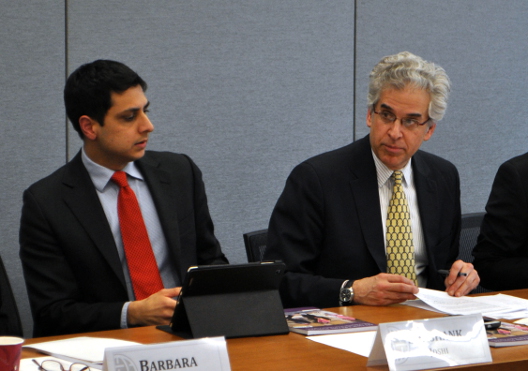 In November 2013, Iran and the five permanent members of the UN Security Council plus Germany (P5+1) signed an interim agreement on the Iranian nuclear program. While a significant breakthrough, the deal has not been universally considered a guarantee against Iranian acquisition of nuclear weapons. Focusing on regional views of nuclear diplomacy with Iran, the Atlantic Council’s Brent Scowcroft Center on International Security and South Asia Center jointly hosted a roundtable discussion on January 27, 2014 with Royal United Services Institute (RUSI) scholars and Atlantic Council experts. The roundtable discussion forms part of a wider strategic partnership between the Atlantic Council and RUSI.
In November 2013, Iran and the five permanent members of the UN Security Council plus Germany (P5+1) signed an interim agreement on the Iranian nuclear program. While a significant breakthrough, the deal has not been universally considered a guarantee against Iranian acquisition of nuclear weapons. Focusing on regional views of nuclear diplomacy with Iran, the Atlantic Council’s Brent Scowcroft Center on International Security and South Asia Center jointly hosted a roundtable discussion on January 27, 2014 with Royal United Services Institute (RUSI) scholars and Atlantic Council experts. The roundtable discussion forms part of a wider strategic partnership between the Atlantic Council and RUSI.
RUSI‘s Shashank Joshi and Malcolm Chalmers presented the findings of a recently published Whitehall Report, “An Uncertain Future”, to a Washington audience, bringing together the analysis and conclusions from extensive interviews with policy elites in the Middle East. The participants had a dynamic conversation on the diversity of national threat perceptions in the region with regard to Iran in general and its nuclear program in particular. The discussion highlighted the limited range of security options available to Iran’s neighbours and their impacts on existing US security arrangements in the Middle East. The potential regional and international responses to a breakdown of negotiations and subsequent Iranian nuclearization were also discussed. The participants assessed the recent political developments in Iran under President Hassan Rouhani and the potential impacts of the coming elections both domestically as well as throughout the region.
The Atlantic Council’s Brent Scowcroft Center on International Security will be launching a major body of work on the Middle East and the changing role of the United States in the region in 2014. This will culminate with a paper on US strategy toward the Middle East, jointly published by the Scowcroft Center and the Rafik Hariri Center for the Middle East later in the year.
